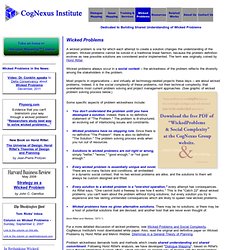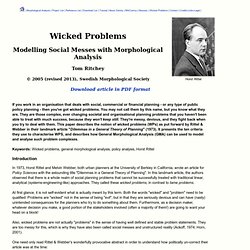

Wicked Problems. Wicked Problems A wicked problem is one for which each attempt to create a solution changes the understanding of the problem.

Wicked problems cannot be solved in a traditional linear fashion, because the problem definition evolves as new possible solutions are considered and/or implemented. The term was originally coined by Horst Rittel. Wicked problems always occur in a social context -- the wickedness of the problem reflects the diversity among the stakeholders in the problem. Most projects in organizations -- and virtually all technology-related projects these days -- are about wicked problems. Some specific aspects of problem wickedness include: You don't understand the problem until you have developed a solution. Wicked problems have no stopping rule. Solutions to wicked problems are not right or wrong, simply "better," "worse," "good enough," or "not good enough. " Every wicked problem is essentially unique and novel. Wicked problems have no given alternative solutions.
Wicked Problems: Problems Worth Solving - My Epiphany. I became interested in the power of design in social contexts during a project at my former employer, frog design.

Project Masiluleke (or Project M) was organized by Pop! Tech, frog, and MTN, an African mobile phone operator. Project M was designed to help stop the spread of AIDS in KwaZulu-Natal, a South African province with about 10 million people, including an estimated four million who are HIV-positive and 400,000 who will develop AIDS each year.Dugger, Celia. "South Africa Is Seen to Lag in H.I.V. Fight. " Only 500,000 people have been tested for the disease and know their status, and of the 200,000 people in treatment, close to 40% will abandon the treatment program within two years.
In many ways, the societal norms of the country were more difficult to overcome than lack of test kit accessibility, the interdisciplinary team routinely noticed during initial research. Research also showed that an estimated 80% to 90% of South Africans have access to a mobile phone. Wickedproblems. Wicked Problems. If you work in an organisation that deals with social, commercial or financial planning - or any type of public policy planning - then you've got wicked problems.

You may not call them by this name, but you know what they are. They are those complex, ever changing societal and organisational planning problems that you haven't been able to treat with much success, because they won't keep still. They're messy, devious, and they fight back when you try to deal with them. This paper describes the notion of wicked problems (WPs) as put forward by Rittel & Webber in their landmark article "Dilemmas in a General Theory of Planning" (1973).
It presents the ten criteria they use to characterise WPS, and describes how General Morphological Analysis (GMA) can be used to model and analyse such problem complexes. Keywords: Wicked problems, general morphological analysis, policy analysis, Horst Rittel Introduction At first glance, it is not self-evident what is actually meant by this term. 1. 2.